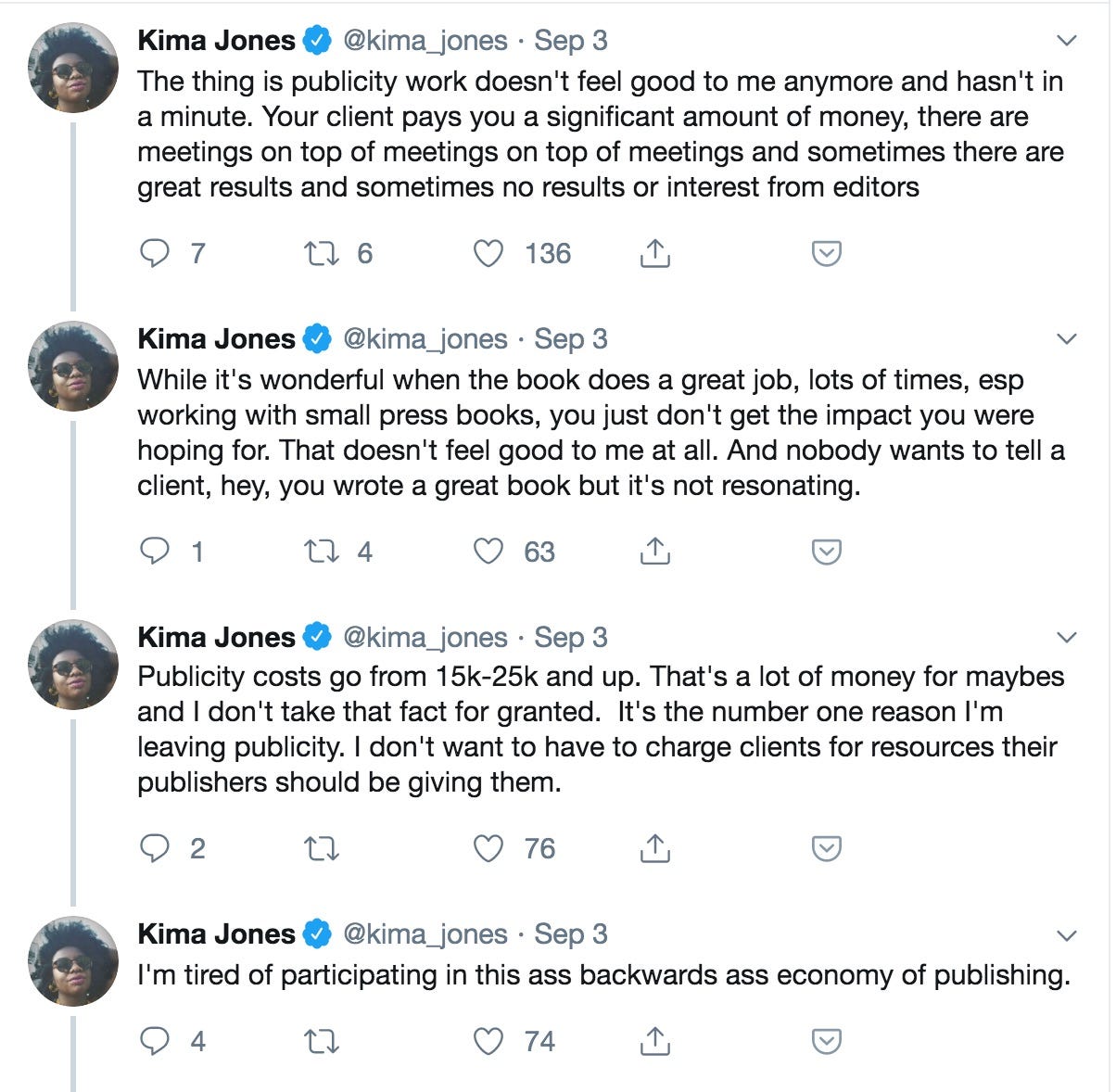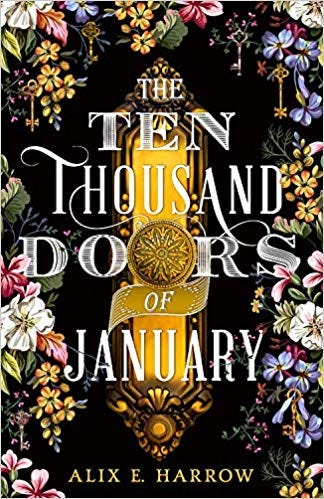Hi friends,
I’m not going to write about the stuff I was tweeting about over the weekend (because apparently this newsletter is now just an extension of Twitter) (tl:dr, don’t respond to rejections ever) because I’m tired of thinking about it and it’s dumb and not a good use of my time. Thank you to all of you who tweeted nice things to me.
What I DO want to do is talk about publicity. This feels like old news in our never-ending news cycle, but it was literally only seven days ago.
Kima Jones, co-founder of Jack Jones Literary Arts, a publicity company focused on promoting writers of color, tweeted that she’s done with book publicity last week. I don’t blame her.

Kima is talking about freelance publicity. She and others at her company put together publicity plans to get a book into editors’, reviewers’, influencers’ hands in hopes they will tell other people how great said book and author are. That’s all publicity is—getting a book and author in front of eyeballs so that people know about it and can decide if they want to buy it. That’s it. There’s no other magic to this.
The publisher also does this, and freelance publicists work with publishers to coordinate their efforts so that Real Simple magazine’s books editor doesn’t get 2 copies of the same book. She already has a mountain of review copies on her desk, and it probably does more harm than good for her to get more than one.
You may have read the above thread and thought “15k-25k”?????????????? For something the publisher is supposed to do!!!!??? And, well, yeah. All publicity campaigns don’t cost that much, but, well, freelance publicists are providing a valuable service and they’re worth that much.
But the thing is, as Kima says, that money doesn’t guarantee anything. You can send out all the books in the world and that doesn’t mean anyone with cover it. You can send gift baskets and elaborately packaged books that look more like wedding gifts than ARCs, and it still won’t mean the Times will review the book. It’s not a payola system. All anyone can do is put the books out there and hope for the best.
It’s not a buckshot approach, either. Follow any journalist on Twitter for 5 minutes and you’ll hear (justifiable!) complaints about PR pitches that have nothing to do with their beat. This goes the same for those who do book coverage, in any form of media. It is the job of the publicist—freelance or in-house at a publisher—to know who covers what and keep up with the changes. It’s exhausting, I imagine, and there’s no central database where editors update all their information. Would that it t’were. (There’s no such database for book editors at publishing houses either, as much as I would like to will it into being.)
And also: there are X billion books published a year and the TODAY show has like, what, 4 authors on a week maybe? 12 a month? How many weeks does that show air new episodes? I have no idea. But you can see there is a distinct lack of zeros on the end of those numbers, so statistically speaking, no one is going to get on the TODAY show. And if you’re paying 25k, you’re probably going to expect to get on the TODAY show.
The system is not good. The system isn’t broken because there is no system. Publicists work SO SO SO SO SO hard with the limited resources they have and they deserve all the praise and gift baskets we can muster. But they aren’t magic. All we have is media and that’s where people find out about books so there we are. We also have librarians and booksellers and there are whole other systems to get them books so they can connect the right reader to the right book. Goodreads was supposed to solve some of this, the profound failure of book discoverability, but it didn’t and won’t. Every time I talk to someone in tech I beg them to solve this for us, but I don’t exactly know how.
We also don’t have data for this and I don’t know how we’d get it. There’s no way to track how someone sees a book on Twitter or on their friend’s bookshelf and then goes and buys it in a store. Sure, if they buy it online there’s referral traffic, but people do still, I promise, buy physical books in stores or—gasp—borrow from a library and the algorithms can’t track all that (yet).
The only thing that really, truly works, imho, is word of mouth. Think of the last book you borrowed or bought. Where did you hear about it? How did you hear about it? Chances are, person you trust (whether they are a celebrity or a friend) told you something was good. God bless Reese Witherspoon taking up the Oprah book club mantel. This is great!!! This is exactly how word of mouth, real and manufactured, for lack of a better word, works.
And that’s why the publisher relies heavily on the author for publicity. The author knows the people who already like them, or to look at it from the other side, readers who follow the author already know they like them. Authors often know the other outlets that their readers will trust, and can thus connect their publisher to those places to get them the resources to publicize the book, review copies or whatever. Yes, a publisher has a better chance of getting to Reese than most people, so they can do that. And the author can bring them the other people or places they don’t already know about.
This is why platform is important. This is why social media is important. These are not the only things that are important, but they’re all part of the publicity soup. The author can’t do it alone and neither can the publisher. Both sides usually think the other should be doing more, and I think that’s basically A: true and B: a product of the complete crapshoot that is publicity. You can do SO MUCH and have none of it pan out. And it’s no one’s fault, it just is. There’s only one Reese, only one TODAY show.
I think about this a lot. I try not to tell my clients IT’S ALL BUNK DON’T EXPECT ANYTHING. I also don’t say, and don’t really believe, that one publisher can guarantee certain publicity things over another. It’s all pretty ¯\_(ツ)_/¯. Great books rise to the top and great books are missed. It’s not fair. Nothing about publishing is fair.
All you can do is try and feed back into the system. Tell someone about a book you love. Make book evangelism a priority. Maybe it will all come back around to you.
I hope this wasn’t too depressing. I hope it is freeing in a I can only do what I can do and a let’s give this s shot way, that also quells the I must have a billion followers or I’m nothing panic I see so much. It’s ok. Everyone else is pretty much in the same boat, even if it dosen’t seem like it.
In publicity news! It’s the publication day of Alix E. Harrow’s THE TEN THOUSAND DOORS OF JANUARY, which is an amazing portal fantasy that will whisk your heart straight out of your chest and never let it go. Everyone (it’s an IndieNext pick, a B&N Discover New Writers pick, an Amazon Top Ten Best of September and more) loves this book. I think you will, too. Also, it’s as gorgeous on the outside as it is on the inside.

XOXO,
Kate


